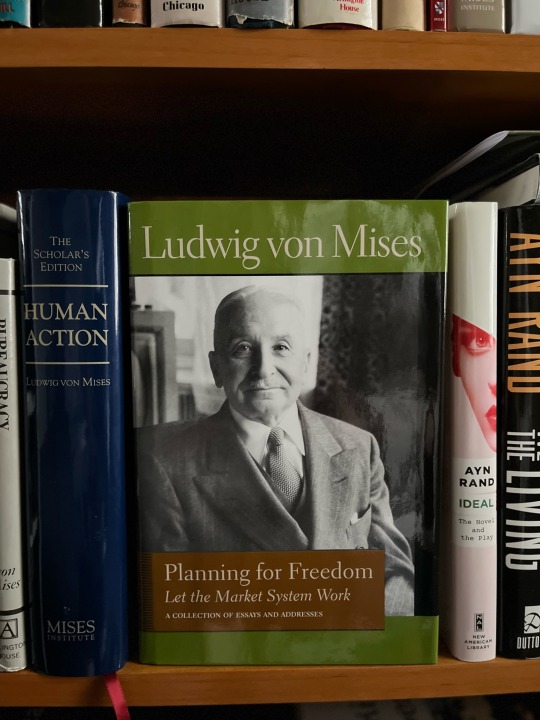#hayek
Text
Language is the optimal self-regulating system!
To borrow Hayek’s idea of spontaneous order:
language is “the result of human action but not human design”.
Also be sure to check out the author of this article’s latest book, Talk on the wild side: Why language can’t be tamed:

72 notes
·
View notes
Text

Selectional affinities
“I’m a slave 4 U” VMAs, Britney Spears, 2001
“From dusk till dawn”, R. Rodriguez, 1996
#selectional affinities#snaps#film#movie#britney#Britney spears#slave 4 u#VMAs#snake#boa#Britney spears snake#salma hayek#hayek#from dusk till dawn#Rodriguez#robert rodriguez#pop#pop music#pop star#superstar#inspiration
11 notes
·
View notes
Text

“Socialism Leads to Total Control
But the designs of the Communists, Socialists, and all their allies aim at something else. They want to establish the authoritarian system. What they mean in extolling the benefits to be derived from what they call "planning" is a society in which all of the people should be prevented from planning their own conduct and from arranging their lives according to their own moral convictions. One plan alone should prevail, the plan of the great idol State (with a capital S), the plan of the supreme chief of the government, enforced by the police. Every individual should be forced to renounce his autonomy and to obey, without asking questions, the orders issued from the Politburo, the Führer's secretariat. This is the kind of freedom that Engels had in mind. It is precisely the opposite of what the term freedom used to signify up to our age.
It was the great merit of Professor Friedrich von Hayek to have directed attention to the authoritarian character of the socialist schemes, whether they are advocated by international or by nationalist socialists, by atheists or by misguided believers, by white-skinned or by dark-skinned fanatics. Although there have always been authors who exposed the authoritarianism of the socialist designs, the main criticism of socialism centered around its economic inadequacy, and did not sufficiently deal with its effects upon the lives of the citizens. Because of this neglect of the human angle of the issue, the great majority of those supporting socialist policies vaguely assumed that the restriction of the individuals' freedom by a socialist regime will apply "only" to economic matters and will not affect freedom in non-economic affairs.
But as Hayek in 1944 clearly pointed out in his book The Road To Serfdom, economic control is not merely control of a sector of human life that can be separated from the rest; it is the control of the means for all our ends. As the socialist state has sole control of the means, it has the power to determine which ends are to be served and what men are to strive for. It is not an accident that Marxian socialism in Russia and nationalist socialism in Germany resulted in the complete abolition of all civil liberties and the establishment of the most rigid despotism. Tyranny is the political corollary of socialism, as representative government is the political corollary of the market economy.
Now Professor Hayek has enlarged and substantiated his ideas in a comprehensive treatise, The Constitution of Liberty. In the first two parts of this book the author provides a brilliant exposition of the meaning of liberty and the creative powers of a free civilization. Endorsing the famous definition that describes liberty as the rule of laws and not of men, he analyzes the constitutional and legal foundations of a commonwealth of free citizens. He contrasts the two schemes of society's social and political organization, government by the people (representative government) based upon legality, and government by the discretionary power of an authoritarian ruler or a ruling clique, an Obrigkeit as the Germans used to call it. Fully appreciating the moral, practical and material superiority of the former, he shows in detail what the legal requirements of such a state of affairs are and what has to be done in order to make it work and to defend it against the machinations of its foes.
The Welfare State Leads to Socialism
Unfortunately, the third part of Professor Hayek's book is rather disappointing. Here the author tries to distinguish between socialism and the Welfare State. Socialism, he alleges, is on the decline; the Welfare State is supplanting it. And he thinks that the Welfare State is, under certain conditions, compatible with liberty.
In fact, the Welfare State is merely a method for transforming the market economy step by step into socialism. The original plan of socialist action as developed by Karl Marx in 1848 in the Communist Manifesto aimed at a gradual realization of socialism by a series of governmental measures. The ten most powerful of such measures were enumerated in the Manifesto. They are well known to everybody because they are the very measures that form the essence of the activities of the Welfare State, of Bismarck's and the kaiser's German Sozialbolitik as well as of the American New Deal and British Fabian Socialism. The Communist Manifesto calls these measures which it suggests "economically insufficient and untenable," but it stresses the fact that "in the course of the movement [they] outstrip themselves, necessitate further inroads upon the old social order, and are unavoidable as a means of entirely revolutionizing the mode of production."
Later, Marx adopted a different method for the policies of his party. He abandoned the tactics of a gradual approach to the total state of socialism and instead advocated a violent revolutionary overthrow of the "bourgeois” system that at one stroke should "liquidate" the "exploiters" and establish "the dictatorship of the proletariat." It was this that Lenin did in 1917 in Russia and what the Communist International plans to achieve everywhere. What separates the Communists from the advocates of the Welfare State is not the ultimate goal of their endeavors, but the methods by means of which they want to attain a goal that is common to both of them. The difference of opinions that divides them is the same that distinguishes the Marx of 1848 from the Marx of 1867 the year of the first publication of the first volume of Das Kapital.” - Ludwig von Mises, ‘Planning for Freedom: Let the Market System Work; a Collection of Essays and Addresses’ (1952) [pages 112 - 114]

#mises#ludwig von mises#hayek#friedrich von hayek#serfdom#road to serfdom#constitution#constitution of liberty#planning for freedom#libertarianism#libertarian#welfare state#socialism#bookshelf#books#library#rand#ayn rand
10 notes
·
View notes
Text

« Smoke of Ambergris, Tangier, Morocco » by John Singer Sargent, 1879 | Haik in Morocco
It was in 1879, during his trip to the charming city of Tangier, that he produced this painting representing a woman dressed in a Haïk.
#Morocco#Tangier#North Africa#MENA#Middle East#Moroccan Culture#Moroccan Architecture#Haik#Haïk#Moroccan Tradition#Amazigh#Arab#Nothern Morocco#Modesty#Islamic#Humility#Hayek#Moroccan Haik#Painting#john singer sargent#medieval#vintage morocco#medieval morocco#history of morocco#history#art history#anthropology#culture#archaeology#history lover
10 notes
·
View notes
Text
Si los socialistas entendieran de economía, no serían socialistas...
Hayek
@teatro-magico-solo-para-locos
#Hayek#pensador#escritor#libertad#batalla cultural#anticomunismo#antiprogresismo#anti socialismo#pensamiento critico
8 notes
·
View notes
Link
3 notes
·
View notes
Text
Spontaneous order in language

Economist and Nobel laureate Friedrich A. Hayek coined the term spontaneous order (also called “self-organization”) to refer to the emergence of order out of seeming chaos, and recognized that language is a type of spontaneous order as well:
It would be no exaggeration to say that social theory begins with—and has an object only because of—the discovery that there exist orderly structures which are the product of the action of many men but are not the result of human design. In some fields this is now universally accepted. Although there was a time when men believed that even language and morals had been invented by some genius of the past, everybody recognizes now that they are the outcome of a process of evolution whose results nobody foresaw or designed. (emphasis mine)
To Hayek, failure to understand the nature of spontaneous order partly contributes to what he calls “The Fatal Conceit”, as discussed in his well-known book of the same title.
Many people have a fatal conceit about language as well. They believe that language is something that can be manipulated and controlled from the top down, when in fact language is a set of conventions that emerge from the distributed interactions of millions of individuals.
#econ#economics#Hayek#linguistics#language#Austrian economics#self-organization#social science#spontaneous order
4 notes
·
View notes
Text
2023: The Past, Present and Future of Chinese Economics
This article by Peking University Professor Yao Yang, calling for a greater focus on understanding Chinese domestic economic issues rather than theoretical issues reminds just slightly of the July 2023 article by Su Changhe, Dean of the School of International Relations and Public Affairs, Fudan University “China’s Autonomous Political Science Paradigm and Sharing it with the…
View On WordPress
#aging#China#Chinese economics#Communism#Communist Party#contributions#control#criticism#Daron Acemoglu#development#economics#entity list#financial accelerator#government procurement#Hai Wen#Hayek#Heckman#James Heckman#Joseph Stiglitz#market#market economy#Marx#Milton Friedman#planned economy#PRC#publish or perish#rule by law#rule of law#savings#Scott Rozelle
1 note
·
View note
Text
The Golden Rule Of Present Giving At Xmas
Yes, it is that time of the year again, Season’s Greetings! Do you know the golden rule of present giving at Xmas? It is an undeniable truth that showering your love and generosity upon others can make you feel mighty good. The power of giving is often sold short in our economically obsessed world view. Economists don’t like ‘giving’ as a concept, it must be said, they find it simply uneconomical. It does not fit in with their strict interpretation of how markets and the world works. Neoliberalism would choke into its empty trickle down effect vessel if too much giving went on in the economy.
Adam Smith statue, High Street by kim traynor is licensed under CC-BY-SA 2.0
Economics & The Shunning Of Giving
This is why we only allow gift giving at strictly controlled times like Christmas. Nobody in charge of the economy would like to see things like generosity and altruism get out of hand. No, self-interest and blatant greed are emphasised in the understanding of how our economy and market forces operate. They tell us that the father of economics was Adam Smith. A Scottish philosopher and with Adam as a first name – who else could it have been! Scots are infamous for their penny pinching ways – I mean they also claim to have invented golf.
“Smith’s notion of an invisible hand that guides someone seeking to maximize his or her own well-being to provide the best overall result for society as a whole is one of the most compelling notions in the social sciences. Smith and other early economic thinkers such as David Hume gave birth to the field at the onset of the Industrial Revolution.”
- (https://www.imf.org/en/Publications/fandd/issues/Series/Back-to-Basics/Micro-and-Macro#:~:text=Thefieldbeganwiththe,WealthofNationsin1776.)
Photo by cottonbro studio on Pexels.com
Indeed, the golden rule of present giving at Xmas fits in with our economically infatuated world view today. One of the main reasons why giving at Xmas is so powerful is that we hardly ever do it for the other 364 days of the year. Familiarity breeds contempt, after all. Thinking about others is not what modern human beings do too often. Of course, parents, in the most part, remain devoted to their children. Parenting is one long sacrificial act, when you really think about it. They say even hostages learn to love their captors eventually. Devotion to a cause or another human being of your blood can become a labour of love. Economics, on the other hand, is all about self-interest and where that leads us in a business sense. The market place is where we humans get down and dirty in the doing of business with each other.
Circle, Xmas (1907) Joseph Christian by Library of Congress is licensed under CC-CC0 1.0
What Is this Golden Rule?
Quite simply, it is, for every present graciously and generously given to another, you must choose one for yourself. This keeps the economy ticking over in the direction it is established to favour. This self-interest drives our economic wellbeing for the good of the nation and the world. Therefore, according to the golden rule of gift giving at Xmas you must lovingly choose something extra special for yourself. Adam Smith will thank you. Keynes will acknowledge your input. Perhaps, even, Hayek will grant a nod. What will you select for yourself this Christmas that will make you really happy to receive? Choose well, my friend!
Robert Sudha Hamilton is the author of Money Matters: Navigating Credit, Debt, and Financial Freedom.
©MidasWord
No results found
You can try clearing any filters or head to our store's home
Read the full article
0 notes







